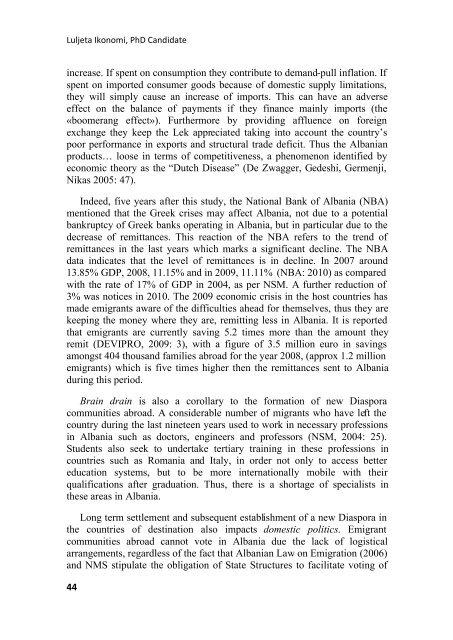SEEU Review vol. 6 Nr. 2 (pdf) - South East European University
SEEU Review vol. 6 Nr. 2 (pdf) - South East European University
SEEU Review vol. 6 Nr. 2 (pdf) - South East European University
You also want an ePaper? Increase the reach of your titles
YUMPU automatically turns print PDFs into web optimized ePapers that Google loves.
Luljeta Ikonomi, PhD Candidateincrease. If spent on consumption they contribute to demand-pull inflation. Ifspent on imported consumer goods because of domestic supply limitations,they will simply cause an increase of imports. This can have an adverseeffect on the balance of payments if they finance mainly imports (the«boomerang effect»). Furthermore by providing affluence on foreignexchange they keep the Lek appreciated taking into account the country’spoor performance in exports and structural trade deficit. Thus the Albanianproducts… loose in terms of competitiveness, a phenomenon identified byeconomic theory as the “Dutch Disease” (De Zwagger, Gedeshi, Germenji,Nikas 2005: 47).Indeed, five years after this study, the National Bank of Albania (NBA)mentioned that the Greek crises may affect Albania, not due to a potentialbankruptcy of Greek banks operating in Albania, but in particular due to thedecrease of remittances. This reaction of the NBA refers to the trend ofremittances in the last years which marks a significant decline. The NBAdata indicates that the level of remittances is in decline. In 2007 around13.85% GDP, 2008, 11.15% and in 2009, 11.11% (NBA: 2010) as comparedwith the rate of 17% of GDP in 2004, as per NSM. A further reduction of3% was notices in 2010. The 2009 economic crisis in the host countries hasmade emigrants aware of the difficulties ahead for themselves, thus they arekeeping the money where they are, remitting less in Albania. It is reportedthat emigrants are currently saving 5.2 times more than the amount theyremit (DEVIPRO, 2009: 3), with a figure of 3.5 million euro in savingsamongst 404 thousand families abroad for the year 2008, (approx 1.2 millionemigrants) which is five times higher then the remittances sent to Albaniaduring this period.Brain drain is also a corollary to the formation of new Diasporacommunities abroad. A considerable number of migrants who have left thecountry during the last nineteen years used to work in necessary professionsin Albania such as doctors, engineers and professors (NSM, 2004: 25).Students also seek to undertake tertiary training in these professions incountries such as Romania and Italy, in order not only to access bettereducation systems, but to be more internationally mobile with theirqualifications after graduation. Thus, there is a shortage of specialists inthese areas in Albania.Long term settlement and subsequent establishment of a new Diaspora inthe countries of destination also impacts domestic politics. Emigrantcommunities abroad cannot vote in Albania due the lack of logisticalarrangements, regardless of the fact that Albanian Law on Emigration (2006)and NMS stipulate the obligation of State Structures to facilitate voting of44
















